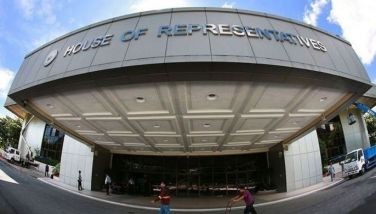DepEd asks LGUs: Stop using schools as evacuation centers

MANILA, Philippines — To prevent prolonged on-site class disruptions during the rainy season, the Department of Education (DepEd) yesterday said it has asked local government units to refrain from using public schools as evacuation centers during typhoons and other calamities.
DepEd Undersecretary Michael Poa said the agency has made this position clear during a recent meeting of the National Disaster Risk Reduction and Management Council (NDRRMC), stressing how students would be unable to use classrooms if the stay of evacuees is prolonged.
As a policy, the DepEd does allow the use of schools as emergency evacuation centers for a maximum of 15 days. However, Poa noted that “it is really unavoidable sometimes” that the evacuees stay longer than this period, especially when regional and division offices would allow it at the request of local government units.
“During the last NDRRMC meeting, we have given the position that we hope our schools will no longer be used as evacuation centers,” Poa told dzBB.
“Classroom instruction gets hampered and it results in learning disruption and we cannot return to schools,” he added.
If disruptions actually occur, Poa said administrators and teachers have been instructed to turn to alternative delivery mode to ensure “learning continuity” and maximize the coverage of learning competencies in public schools.
As of 2019, buildings being used for educational purposes outnumber actual structures dedicated to evacuees during natural calamities.
In preparation for future calamities, over 1,200 schools nationwide have been set for repair and reinforcement against natural disasters after the National Economic and Development Authority approved the DepEd’s P30.56-billion resilient schools project.
DepEd said the Infrastructure for Safer and Resilient Schools project would ensure the recovery and reinforcement of 4,756 school buildings affected by disasters from 2019 to 2023. The ISRS project would be rolled out in the next five years in partnership with the Department of Public Works and Highways and funded through an official development assistance loan from the World Bank.
Various groups and education sector stakeholders have called on the government to invest in climate-resilient education infrastructures, saying schools are among the most vulnerable to disasters.
Among the measures DepEd undertook is securing insurance coverage for over 132,000 public school buildings nationwide for damage and losses caused by natural catastrophes.
The Government Service Insurance System and the Bureau of the Treasury (BTr) assembled P843.11 billion in fire insurance for public school buildings for one year and would cover fire, lightning and natural catastrophes starting Jan. 1, 2024.
The insurance coverage is part of the educational infrastructure security of the BTr under the National Indemnity Insurance Program, which aims to provide adequate and comprehensive insurance protection to critical government assets such as schools, hospitals, roads and bridges.
Meanwhile, the Alliance of Concerned Teachers (ACT) called on the Marcos administration to go for long-term solutions to the climate crisis and improve the working condition of teachers.
President Marcos approved the opening of classes for school year 2024-2025 on July 29 and ending it on April 15 next year to reduce the adverse impacts of holding classes amid intense heat during the hottest months of the year.
“We also reiterate our calls for long-term solutions to the climate crisis. To improve the dire learning environment, the government should go beyond merely adjusting the school calendar and take substantial actions like hiring more teachers, constructing additional classrooms to decrease class sizes, and ensuring proper ventilation in all learning spaces,” ACT chairman Vladimer Quetua said.
- Latest
- Trending





























